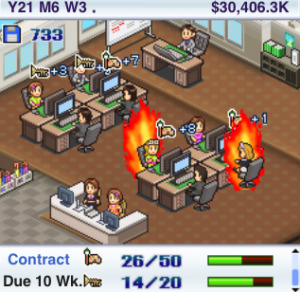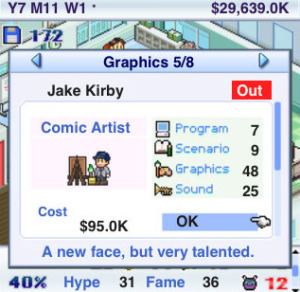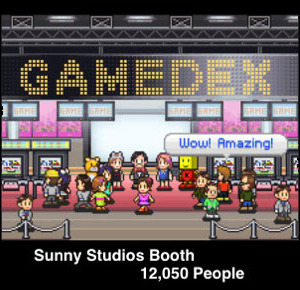
My Game Dev Story
As a games machine, the PC has withered and died and it’s my fault. I’ve let you down. When I founded CardArts Studios, it was with a very clear vision – one where I would help revive the flagging adventure genre and rebuild the PC platform at the same time. How? Through a commitment to quality and creativity, innovation and polish. By paying attention to what the market needed, not just what it deserved, I would rescue the games industry from the momentum of mediocrity.While I started playing Game Dev Story with firm principles and limitless passion, though, it only took me a few years to trade those in for a pay rise and a few chintzy plaques.
Things seemed to start off well, if not profitably. My first release was a PC-only, pirate adventure game that I was sure would be an instant classic. Disregarding the advice of my colleagues and staff, I ploughed all of my attention into creating an accessible and innovative design, high in creativity at the expense of graphics.
‘Graphics don’t matter,’ I yelled at my staff, convinced I was directing them to make a game that would be remembered for decades to come. Sadly, Mankey Island reached only the edge of the Top 30 and the critical response wasn’t just mooted, it was brutal.
Undeterred by the backlash, I kept myself happy by reading the occasional fan letter and focusing on new projects. Companies such as Senga and Intendro were announcing new consoles, but I stayed true to my cause. Sadly, the only difference between Mankey Island and Bay of the Tentacles was that I wasn’t surprised to see the latter fail. By now I was convinced that the industry was out to get me. I kept my staff – the only people I could trust – close through constant training courses, a responsible division of labour and a promise to never fire anyone.
By this point CardArts was ailing faster than an alcoholic in a brewery, especially since I was spending the remaining funds on ways to boost creativity – a facet that nobody seemed to care about. Desperate for a cash injection, I told my underlings to churn out a cheap platform game as fast as they could – ‘Don’t worry about making a masterpiece, just get it on shelves!’ A month later, Crazy Plumber was complete. I wasn’t proud of it, but it seemed a necessary evil; one rubbish casual game now to finance real projects later.
Crazy Plumber accomplished its aims too well, however, and brought in far more than the paltry profit I had projected. It came within a whistle of the Top 10 and provided enough gold coins to secure the future of several adventure games. I should have been happy...but the problem with getting a sip of success is that it makes you want to glug the rest of the bottle.
The next day, Intendro announced a new console and I, seeing a chance to make another big profit in a short space of time, pounced on it. I didn’t mean to end up living in the pockets of console manufacturers, but the deadlines I set myself kept drifting further into the distance - I was always going to return to the PC after the next game, then the next and so on.
 Shoddy console shooters drifted by like bubbles in a stream, each indistinguishable from the next. I advertised aggressively and learned just how far graphics could be used to disguise a lack of innovation. I hired booth babes to represent the company and made myself feel better by saying that, because everyone else was doing it, it was somehow okay.
Shoddy console shooters drifted by like bubbles in a stream, each indistinguishable from the next. I advertised aggressively and learned just how far graphics could be used to disguise a lack of innovation. I hired booth babes to represent the company and made myself feel better by saying that, because everyone else was doing it, it was somehow okay. It wasn’t okay.
Quietly, in the background, the PC perished like the lining of old swimming trunks - gradually and ungracefully. I had promised to return with millions of dollars to invest, but had been gone too long. Gamers had gone elsewhere and found an abundance of terrible console first person shooters bearing my name. As time passed, I drowned out the competition and customers bought in to the hyperbole – my deliberately awful games were hailed as the best ever made. I wanted to cry. Instead, I made sequels.
I can’t complain, however. CardArts is now a multi-million studio with a huge staff and international recognition. I'm successful, but by moving the goal posts to suit a new definition of success, I can’t shake the feeling that this isn't really the point Game Dev Story was trying to make.
Game Dev Story is developed by Kairosoft and is available for the iPhone and other mobile platforms.

MSI MPG Velox 100R Chassis Review
October 14 2021 | 15:04











Want to comment? Please log in.